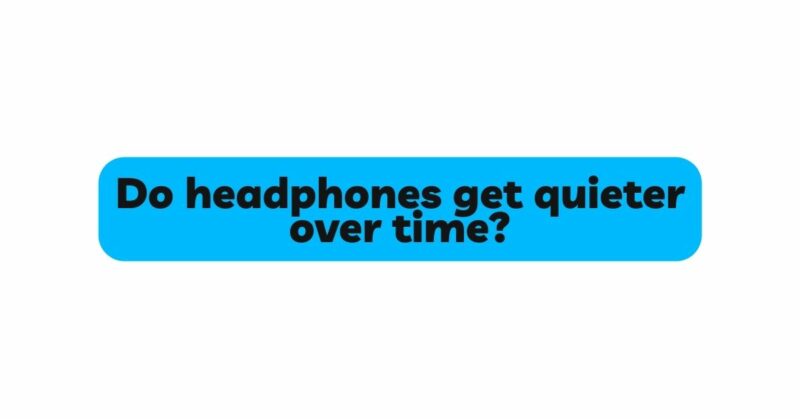Headphones have become an indispensable tool for enjoying music and audio content in our everyday lives. Over time, users may begin to question whether their headphones are gradually becoming quieter. This perceived decrease in sound intensity can be a cause for concern, leading to the belief that headphones lose their original volume capability over time. In this article, we will explore the factors that may contribute to a decrease in headphone volume, examine potential causes, and provide insights into whether headphones do indeed get quieter over time.
- Understanding Sound Reproduction in Headphones:
To comprehend why headphones may appear to get quieter, it is important to grasp the fundamental principles of sound reproduction in these devices. Headphones consist of various components such as drivers, diaphragms, magnets, and voice coils. These elements work in unison to convert electrical signals into audible sound. The electrical signal passes through the voice coil, which interacts with the magnetic field generated by the magnet, resulting in the diaphragm moving and producing sound waves.
- Physical Wear and Tear:
One potential reason for a perceived decrease in headphone volume over time is physical wear and tear. With regular use, headphones are subjected to mechanical stress, leading to the degradation of various components. The movement of the diaphragm can become less responsive, and the voice coil may lose some of its efficiency. As a result, the overall sound output can be compromised, resulting in a quieter listening experience.
- Cable and Connection Issues:
Headphone cables and connectors are prone to wear and damage over time. Faulty cables or loose connections can lead to reduced audio signal transmission, resulting in diminished volume. It is crucial to inspect and maintain the integrity of the headphone cable and connectors, as any damage or connectivity issues can affect the sound output.
- Earpad Deterioration:
Earpads play a crucial role in ensuring both comfort and sound quality. Over time, earpads can deteriorate due to regular use, exposure to sweat and oils, or environmental factors. Deteriorated earpads can affect the seal around the ears, leading to sound leakage and a decrease in perceived volume. Regularly replacing earpads can help maintain optimal sound isolation and prevent volume diminishment.
- Accumulation of Debris and Dust:
The accumulation of debris and dust on the headphone components, particularly on the diaphragm or driver, can impede their performance. Dust particles can restrict the diaphragm’s movement, resulting in reduced sound output and perceived volume. Regular cleaning of the headphones can prevent the buildup of debris and maintain optimal sound reproduction.
- Audio Source and Settings:
It is essential to consider the audio source and settings when assessing changes in headphone volume. Different devices, such as smartphones, laptops, or audio interfaces, can have varying output levels. Additionally, software or hardware settings, such as volume limiters or equalizer adjustments, can impact the perceived volume. Ensuring that the audio source is set to an appropriate level and that the settings are optimized can help maintain consistent volume levels over time.
- Perceptual Adaptation:
Human perception plays a significant role in how we perceive volume and sound. Our hearing can adapt to different listening environments and sound levels, resulting in a subjective perception of volume changes. Listeners may become accustomed to a particular volume level over time, leading to the perception that their headphones have become quieter. It is important to account for perceptual adaptation when evaluating changes in volume over an extended period.
Conclusion:
While headphones can exhibit a decrease in volume over time due to physical wear and tear, cable issues, earpad deterioration, or the accumulation of debris, it is crucial to consider various factors before concluding that headphones inherently get quieter. Regular maintenance, including cleaning, cable inspection, and earpad replacement, can help mitigate volume diminishment. Additionally, perceptual adaptation and individual preferences can influence our perception of volume changes. By understanding the potential causes and implementing proper care and maintenance, users can ensure that their headphones continue to deliver optimal sound quality and volume over time.

